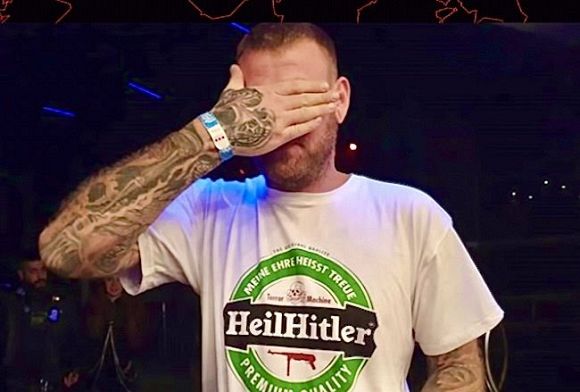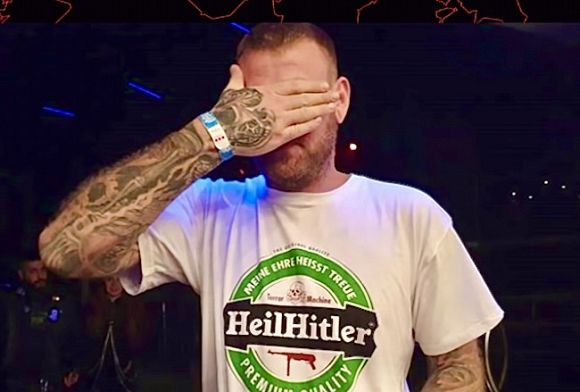When anti-trans activist Kellie-Jay Keen-Minshull visited Australia recently, most media outlets refused to give her hate speech a platform, writes Dr Victoria Fielding.
I WAS PROUD to see the Australian public and political leaders tell hateful, discriminatory British anti-trans activist Kellie-Jay Keen-Minshull (aka Posie Parker) that she was not welcome here.
Keen-Minshull’s rallies were badly attended by supporters, apart from a large group of Nazis in Victoria who inadvertently did a great job of exposing the extremist ideologies behind the anti-trans movement.
A violent group of religious extremists also attacked LGBTIQA+ protesters outside a church in Sydney where Mark Latham was spewing anti-trans hate, demonstrating that Keen-Minshull’s movement’s claims of caring about violence against women are a thinly veiled disguise for hateful, violent bigotry.
Political leaders of all persuasions condemned Keen-Minshull’s anti-trans hate circus, apart from the notable exceptions of Victorian Liberal Moira Deeming and One Nation. Former Liberal Warringah candidate Katherine Deves and Tasmanian Senator Claire Chandler also planned to attend anti-trans rallies but pulled out saying they feared for their safety.
Pleasingly, most mainstream media outlets reported about Keen-Minshull’s hateful anti-trans rallies but chose not to give her hate a platform. They did this by choosing not to provide her space to abuse trans people through interviews and did not quote her speeches.
Neil Mitchell on 3AW bucked this responsible trend by interviewing Keen-Minshull on his radio show. Mitchell gave Keen-Minshull a sympathetic platform to justify her campaign of hate, to frame herself as a victim of the Nazis who support her, to claim she was the one being threatened with violence and to play down her links to White supremacists.
Mitchell’s usually aggressive, interrogating style of performative shock-jock interviewing was absent in this interview. Instead, Keen-Minshull was given a platform to make her anti-trans bigoted case, including regularly denigrating, making unjustified allegations against and trying to erase transgender people, which seems to be the whole point of her existence.
Mitchell did ask Keen-Minshull if she had empathy for vulnerable people going through gender transition, which of course she brushed aside. He then suggested to her that Victorian Liberal Leader John Pesutto had an “attack of wokeness” in trying to expel Moira Deeming from the Victorian Liberal Party for her involvement in the hate movement, to which Keen-Minshull agreed and accused Pesutto of virtue signalling.
The interview was posted online by 3AW under the headline: ‘Anti-transgender activist says Victoria is “gaslighting” women, hits back at John Pesutto.’ Arbiter of hate, Keen-Minshull’s voice was front and centre, given a legitimacy that no trans person or activist was afforded. As far as I can tell, no right of reply was offered.
When Mitchell was criticised for this interview, he defensively justified it, saying:
“I would interview Adolf Hitler if I could, and Chairman Mao, and Richard Nixon... I would interview them, not to endorse their evil, but to question it. To try to work out where it was based. To try to ensure it didn't happen again. To delve into it.”
Proud of himself for being the only mainstream journalist to interview Keen-Minshull, Mitchell claimed he didn’t like “all of what she said” (just some of it!). But, unlike the stations who responsibly did not give her hate movement a platform, he claimed he was not in the “dangerous territory” of censoring voices he doesn’t agree with.
Ridiculous arguments like this are dragged out whenever journalists are questioned about their terrible judgement in giving voice to hate.
When Sarah Ferguson on ABC’s Four Corners interviewed Steve Bannon, show producer Sally Neighbour said, much like Mitchell, that powerful, influential people should be interrogated by news media.
Let’s make clear that when a journalist decides not to give a hate movement a platform, they are not censoring. They’re making a sound judgement about the potential harm of platforming discriminatory, dangerous, harmful views. It is clearly in the public interest not to platform hate.
Even worse, journalists don’t seem to acknowledge when they interview someone they deem to be powerful and therefore worthy of a platform – like Steve Bannon, like Kellie-Jay Keen-Minshull, like Adolf Hitler – they are helping to legitimise that person’s ideas and make them more powerful. Their platform is being used for hate and they need to take responsibility for the consequences and the harm that hate causes.
Since Mitchell brought up Hitler and Nazis joined with anti-trans bigots, it’s worth saying that an important factor in the Nazi accumulation of power in Germany in the 1930s was their establishment of media ownership and power. Hitler’s media platforms spread the hate that enabled the holocaust.
Mitchell and Neighbour’s suggestion that a few tough-worded questions from an interviewer will adequately hold a hateful person to account, and even halt their hate, and that their interview can block them from spreading hatred, is naivety mixed with arrogance.
The outlets that do not platform the hateful words of Keen-Minshull are not censoring. It’s not cancel culture. It’s not de-platforming. It’s simply choosing not to legitimise her hateful bile, a decision made to avoid harm. Harm like endorsing violence against trans people. Harm like encouraging vulnerable trans people to kill themselves.
Mitchell said if journalists had to like everyone they interviewed, they would never interview anyone. This is not about Mitchell and who he happens to agree or disagree with. In his wet-lettuce attempt at interviewing Keen-Minshull, he gave her a platform to do harm. That harm was his choice and was on him.
Dr Victoria Fielding is an Independent Australia columnist. You can follow Victoria on Twitter @DrVicFielding.
 This work is licensed under a Creative Commons Attribution-NonCommercial-NoDerivs 3.0 Australia License
This work is licensed under a Creative Commons Attribution-NonCommercial-NoDerivs 3.0 Australia License
Support independent journalism Subscribe to IA.















